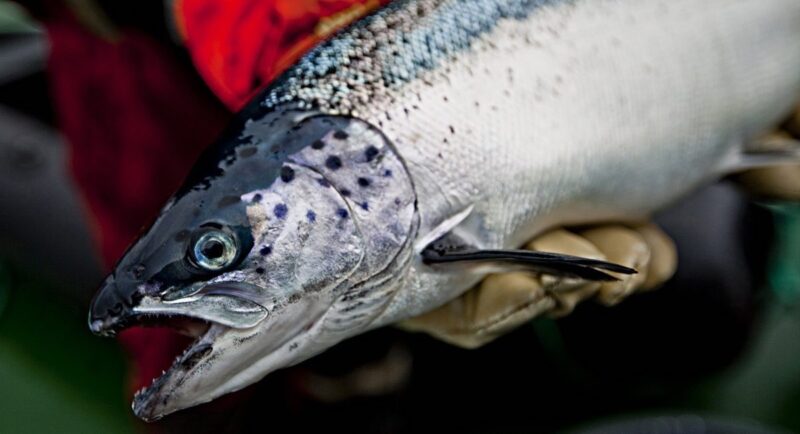Cermaq Canada to trial algal oil in its salmon feed
The introduction of algal oil aims to significantly reduce Cermaq’s dependence on traditional marine fish oils in their salmon feed.
By SeaWestNews
In a ground-breaking move towards more eco-friendly aquaculture, Cermaq Canada has announced a partnership to trial the use of algal oil in their salmon feed across several of its fish farms in British Columbia.
The introduction of algal oil aims to significantly reduce Cermaq’s dependence on traditional marine fish oils in their salmon feed.
Cermaq Canada said in a statement that it has committed to a nutritional innovation trial of Cargill’s salmon feed with Veramaris algal oil across several Cermaq farms in British Columbia.
The Netherlands-based Veramaris was recently granted the first market authorization in Canada for the inclusion of algal oil in feeds for salmonid species after a three-year registration process.
The authorization allows Veramaris to provide Canada’s salmon farmers with EPA (eicosapentaenoic acid) and DHA (docosahexaenoic acid) — nutrients essential for fish health and welfare and the nutritional value of farm-raised seafood.
Veramaris algal oil is produced in Blair, Nebraska, USA, to support the industry’s adoption of alternative omega-3 fatty acid sources and reduce its dependency on marine ingredients like fish oil and fishmeal.
“By leveraging the experience of the use of Veramaris algal oil across Cermaq, we look forward to conducting the sea trials and learning more about how we can incorporate this exciting alternative to marine fish oils into our nutritional strategies,” said David Kiemele, managing director Cermaq Canada.
“Implementing these innovative solutions demonstrates how quickly the aquaculture industry in Canada can move to adopt new techniques…Our company is proud to be one of the first movers in this space in Canada,” he said.
The feeding period will begin in May and focus on introducing the new feed to salmon close to harvest size.
“Farmers in Chile, Norway, and Ecuador have been successfully using Veramaris natural marine algal oil in their feed for years now. With the recent registration in Canada, we are pleased to see farmers adopting it in salmon feed there,” said Jorge Torres Lagreze, Business Development Americas at Veramaris.
“Cargill is excited to collaborate with our valued partners Cermaq and Veramaris to introduce a new novel ingredient in the Canadian aquaculture market,” said Isaac Yun, Country Director at Cargill Aqua Nutrition.
“As we move forward on this sustainability journey for our customers, it is critical we provide alternatives in biodiversity for the feed industry to progress into the future of aquaculture,” he said.
According to Veramaris, its algal oil has a high (50%) concentration of the key fatty acids needed to feed farmed salmon and maintain their health – and its significance is best summarized by the fact that just one metric tonne of Veramaris algal oil is the equivalent of 60 tonnes of wild-caught fish.
Farmed salmon is already the most resource-efficient animal protein on the planet. When compared to chicken, pork and beef production, farmed salmon consume the least amount of feed, use the least amount of fresh water, and has the lowest carbon footprint.
(Image courtesy of Cermaq)

